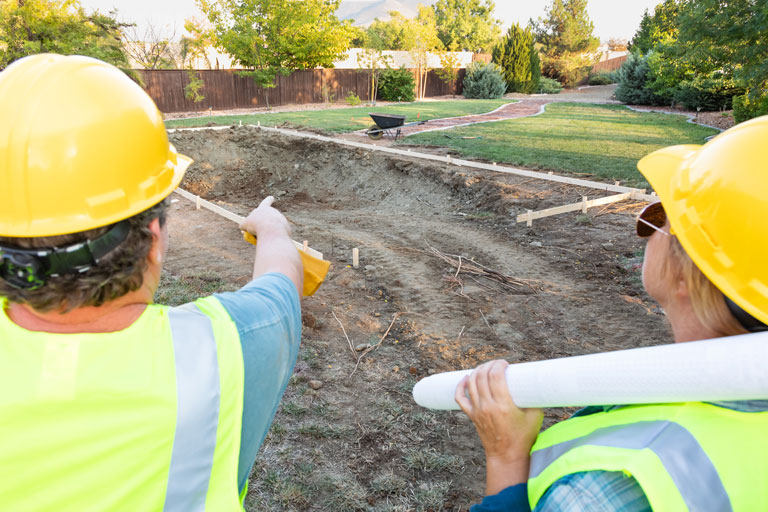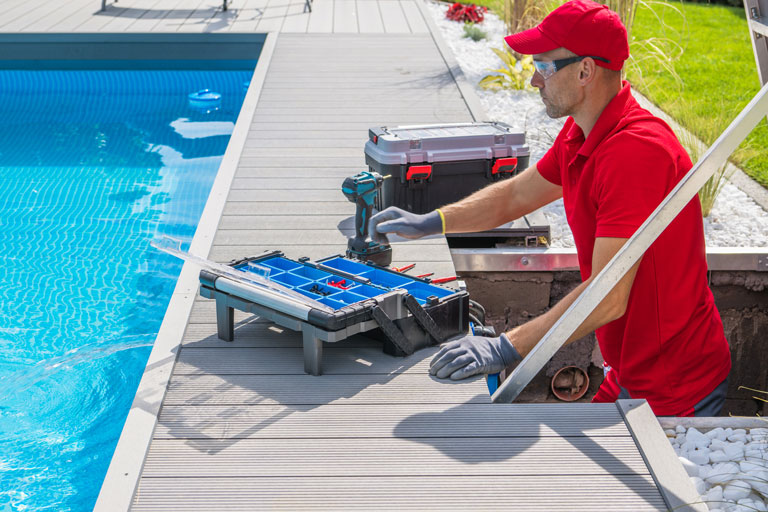Pool building and service companies can have a heck of a business given the right circumstances. Including location, client, base, marketing, and payment options. A backyard pool (or indoor pool) is something many homeowners would like to have.
A pool can improve a home’s property value, make it appear more luxurious, and provide a space for relaxation, exercise, and socialization. So if having a pool is so desirable, why doesn’t everybody get one? The answer, of course, is their cost.
It’s true that some homeowners don’t want a pool because they require maintenance, while others view them as a safety issue because of pets or children. And some homeowners just don’t feel like they have the space in their backyard, or their homeowner’s association does not allow pools. While these are all valid reasons, the main reason is often cost. And as it turns out, that’s a sales objection a pool builder can overcome if they offer financing options.
Are Pools a Common Home Improvement Project?
First, let’s take a look at the broader landscape of home improvement and landscaping and see where pool building fits in financially and in terms of popularity.
By far the most popular home improvement projects among consumers are painting (32%), bathroom remodeling (28%), smart device installation (27%), flooring (27%), and landscaping (24%). And if you’re wondering why those numbers add up to more than 100%, it’s because homeowners may do more than one home improvement project in a given year.
As you can see, some of these home improvement projects could be DIY ventures (do it yourself) accompanied by lots of social media posting and photo filters with a Bohemian effect. Others will require a specialized contractor. And one of those jobs requiring a specialized contractor is installing an in-ground pool.
The Pool Building Industry
The pool-building business has an estimated market size of $9.2 billion. First, the bad news for business owners in the swimming pool business: the swimming pool market shrank 4.2% in 2023 alone and 0.3% in the past five years.
This trend may indicate that as inflation picks up, consumers have less disposable income for large purchases like a pool installation. It may also be tied to a decrease in new home construction, which is tied to some of the same economic factors as inflation and the recession.
The good news is that there is plenty of historic indication of homeowner interest. Trade group Pool & Hot Tub Alliance estimates that of the 10.7 million swimming pools in the United States, 10.4 million are residential, leaving only 300,000 public pools (like your local pool).
With roughly 8% of the 130 million homes in the U.S. having a pool, there are customers to be captured—and with 99% of pools being residential (as cited above) there’s a decent chance that homeowners are interested…if the price is right.
How Much Does a Swimming Pool Cost?
If you own a pool installation business, this may seem like preaching to the choir. The average cost of an in-ground pool is $35,000 but ranges from $28,000 up to $55,500. Customized upgrades like waterfalls, decking, lighting, and hot tubs can add $2,000 to $10,000 to that price.
Of course, not every residential pool is an in-ground fiberglass or concrete installation. There are also above-ground pools, which comprise 41% of residential pools. The cost of an above-ground pool is significantly less, averaging $2,900 per pool. Although some can go up to $11,000 or more.
However, there are some obvious downsides to this type of pool, including continuity with the landscaping. The look of an above-ground pool cannot compare to the oasis of an in-ground pool surrounded by water features and illuminated by custom lighting.

Is The Swimming Pool Business Profitable?
From the perspective of the pool building company, an in-ground pool is certainly a better proposition. It is highly profitable in comparison. Someone starting a pool installation business is not looking to collect a few hundred dollars here and there after supplies and labor for installing above-ground pools. The large project of installing an in-ground pool, perhaps optimized by upselling features like a waterfall or surrounding stonework, is where the money is at.
How much do pool companies make? That depends on how much business they can handle. But according to one study, gross profit margins are ideally 22-28% and net profit 5-7%. Obviously, a $60,000 project is much more appealing than a $6,000 project.
The challenge is just getting homeowners to pay for in-ground pools since they are a significant investment. As it turns out, financing options are probably the best way to make that happen.
How Do Homeowners Usually Pay for a Pool?
Most consumers are not going to pay cash for something like a pool. In fact, most consumers don’t even have that much cash lying around. Instead, they will get some sort of loan, tap into a credit line, or use money from a savings or retirement account by paying with a check or debit card.
HELOC
One of the most popular types of financing options for large home improvement projects is the home equity line of credit or HELOC. Homeowners who have paid down 15-20% of their mortgage can take out a credit lineup to the amount of equity they have in their home.
For instance, someone with a $400,000 residence and 20% equity in their property could get $80,000 to transform their backyard into a tropical paradise with a centerpiece of a waterfall and organic-shaped pool.
Unfortunately, there are many downsides to a HELOC. The first of which is that they’re next to impossible for most consumers to get these days, especially after the subprime mortgage crisis. Most HELOCs also have variable rates. This means that the rates can go up if the underlying index they’re tied to changes.
Lastly, the collateral for a HELOC is the house itself. That means (returning to our above example) if the borrower cannot pay back the $80,000 they borrowed on time, Wells Fargo may be throwing a luau in their backyard. Aloha, mahalo, and pass the pineapple!

Credit
Another option is to use a credit card or a combination of credit cards since the average credit limit per card is about $13,000. Not enough to cover a whole pool. And we trust that no one wants a half pool.
However, many consumers would be reluctant to pursue this avenue. Why? Because it could result in a payment management nightmare, with 3-4 (or more) different credit card bills to keep track of, all of which have different interest rates or different amounts of time for a 0% promotion.
For those consumers who do have larger credit lines and a bank willing to extend something like an 18-21 month direct deposit, balance transfer, or new account opening 0% promotion, this could be a good idea. But those consumers will be few and far between.
Savings
Some consumers will not be averse to tapping into their savings in order to pay for something like a pool. These consumers more often than not will probably be older, having already paid for large life expenses like a wedding or college tuition.
They may use a savings account or they may use some of the money that their required minimum distribution forces them to take out of their nest egg, especially if they have nothing else to spend the money on.
Once again, while this will apply to some homeowners, it won’t apply to all. Moreover, older homeowners are not always likely to become pool owners. They may feel it requires too much maintenance or they may be on the cusp of selling their home and moving to a planned retirement community in Florida.
Cash is out. HELOCs are one (not great) option with many downsides. Credit cards are a possibility for some consumers. Savings or a 401(k) are an option for consumers who have already cracked open the nest egg. For everyone else, the biggest problem is where to find $35,000 to $60,000. But that’s also something you can help them out with.

Marketing to Clients For Pool Services
As pool contractors find out, running a small business is about more than doing whatever it is you do best (in this case, presumably building pools). It’s also about the back-end stuff like registering your business with the local chamber of commerce, getting your required business licenses, and obtaining the right business insurance. Then there is the ongoing matter of getting new customers, which is a lot more involved these days than handing out business cards.
Marketing paradigms these days have largely shifted to digital content. A two-minute time-lapse clip of your team doing something like plastering the inside of the pool or laying paving stones and shrubbery around a pool can go a long way toward getting some attention on Instagram.
Print marketing is not dead either. Marketing campaigns saw a 400% increase in effectiveness when digital and paper ads were combined. Around 82% of consumers trust print ads the most when making a decision about something. And trust is an incredibly important factor when deciding on a purchase that averages $35,000.
POS Loans For a Pool Service Company
One piece of information you can incorporate into your marketing material is financing. Citizens Financial found that just over 3 out of 4 consumers would be more likely to complete a purchase if an easy payment plan is offered at the point of sale. And TD Bank found that 46% of consumers are more likely to purchase a big-ticket item from a vendor who offers financing options, and 78% indicated that financing (or lack thereof) influenced how much they were willing to spend.
These numbers speak volumes because they indicate that not only can financing options make or break a purchase decision entirely, but they can also lead some customers to spend more. In the case of pool installation, that can mean upselling additional features like decking, customized lighting, and that waterfall we keep talking about.
What is POS Lending?
A POS loan or POS financing makes this possible. POS financing is when your payment processor can double as a loan broker, connecting your customer with an appropriate loan on the back, which you can then repackage seamlessly into the sale. All the customer needs to do is input a few pieces of information—more often than not, some of the same pieces of information they’d use to apply for a credit card.
If the customer is approved, you’ll be paid within a matter of days and then they will make their payments to the lender. You’ll get their money and they’ll get their pool. Advertising-these financing possibilities in your marketing material can lead to more phone calls and emails from customers who were on the fence.
Because the loan is generated at the point of sale, it is seamlessly built into the customer experience. There is no lengthy application or underwriting process like they’d have to go through to get a HELOC or personal loan.
The only additional layer of complexity is that in some cases, the normal arrangement is for the customer to pay a portion up front, followed by installments as the work is completed. This standard practice in the construction industry can be integrated into the POS loan arrangement with the help of your payment processor.
You might be wondering: is a pool cleaning business profitable? Pool service companies have somewhat of a captive audience. Once a pool is installed, it ain’t going anywhere. That’s because the same homeowners who installed the pool are unlikely to pay up to $19,000 to have it removed, along with navigating the complex paperwork landscape of county permits. Pool cleaners may have a shot at 40% profit margins, in part because the startup costs are low.

What About Pool Maintenance Services?
The average pool maintenance business is collecting about $1,032 annually from the average customer. Cleaning pools, water testing, and monitoring pool equipment like filters and pumps are just a few of the weekly or biweekly services that a pool maintenance company provides.
While it’s true that a homeowner could perform these functions themselves, some of them can become burdensome—for example, skimming debris off the top of the pool, especially in seasonal climates, or making trips to the supply store for the right chemicals.
Starting a Pool Cleaning Company
To start a pool cleaning or maintenance service, you really won’t need that much capital: estimates suggest anywhere from $2,000 to around $20,000. That said, opening a pool service company is one type of low-hanging fruit for entrepreneurs, especially in areas with lots of pools.
But just like starting a pool construction business, running a pool cleaning business is about more than cleaning and maintaining pools. It’s also about licensures, insurance, marketing, and collecting those customer payments.
Why Pool Maintenance Companies Need a Payment Processor
A payment processor is once again the way to go, especially because what you provide is a recurring service. Homeowners are not going to want to pay cash each time you show up or give you a check. And both of those forms of payment present significant hassles to safely deposit. The way to go is by offering subscription services. And subscription services need to be managed by a payment processor who can automate payments.
Customers provide payment in the form of a credit card, debit card, or P2P app (like PayPal or Venmo) that also facilitates C2B payments. Every month, they will be charged a fee for maintaining your services. You won’t have to keep track of any invoices or run to the bank at the end of the day, because everything will be automated.
Starting a pool company may also mean occasional services beyond routine maintenance, such as repair or replacement of pool components like pumps or drains, or replastering the pool itself. For these one-off expenses, which will certainly be more than the routine $80 or $100 monthly payment, you can also use a payment processor to create and manage invoices while also collecting payment.

Upselling Renovations, Remodeling, and Replacements
In the case of these larger expenses, POS loans may also be relevant. Replastering a pool might cost between $4 and $7 per square foot, for instance, which means an average pool of 16 x 32 feet with four feet of depth on the shallow side and 8 on the deep end can cost as much as $7,000. Customers getting their pool skimmed every month may not be ready to cover such a purchase, so a POS loan can overcome the objection if it’s part of the conversation.
In a related vein, if your pool techs are trained to initiate conversations about these sales (replastering pools, retiling decks, replacing machinery), and they are also trained in the payment and financing aspect, the sale can be completed on their visit.
Once again, a payment processor can facilitate this aspect of starting a pool maintenance business through mobile terminals. These terminals can connect with a smartphone and/or be stored on the truck.
A similar option is to have QR codes that customers can scan, where they will then be taken to a payment page. The only downside to this arrangement is that such transactions are coded as card-not-present, which can result in larger fees for you.
How to Start a Pool Service Company
If you’re interested in learning more about how to start a pool service company or how to start a pool cleaning company, we recommend checking out our article on How to Start a Small Business to get started.
What do you need to start a pool cleaning business? Of course, you will need to obtain the proper supplies and industry knowledge on pool services. But, once you have the basic knowledge, this article can provide a world of knowledge for how to start a pool cleaning business in Texas, California, Florida, or anywhere else consumers may have the demand.

Dive into More Business with a Good Payment Processor
In summary, learning how to start a pool building company or how to start a pool cleaning business is also about learning how to collect payments. A good payment processor who is familiar with the construction business can facilitate this important business aspect. Credit card processing, POS loans, and mobile terminals are just a few of the financial solutions they can provide so that you can focus on building and/or maintaining pools.
To contact sales, click HERE. And to learn more about ECS Payment Processing visit Small Business.
